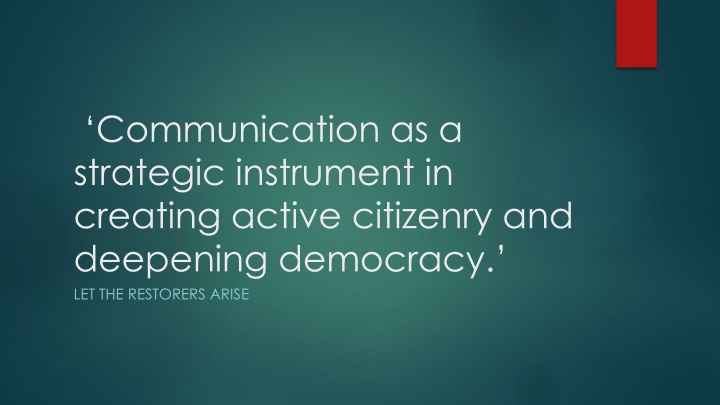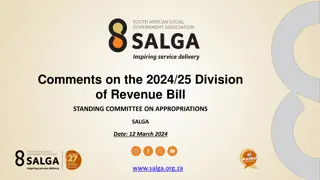
Communication as a Strategic Instrument in Democracy and Citizenry Engagement
Explore the role of communication in fostering active citizenry and deepening democracy, with a focus on post-conflict reconstruction, nation-building, and the development of capable institutions. Delve into key themes such as generational mandates, developmental elites, and democratic political culture.
Download Presentation

Please find below an Image/Link to download the presentation.
The content on the website is provided AS IS for your information and personal use only. It may not be sold, licensed, or shared on other websites without obtaining consent from the author. If you encounter any issues during the download, it is possible that the publisher has removed the file from their server.
You are allowed to download the files provided on this website for personal or commercial use, subject to the condition that they are used lawfully. All files are the property of their respective owners.
The content on the website is provided AS IS for your information and personal use only. It may not be sold, licensed, or shared on other websites without obtaining consent from the author.
E N D
Presentation Transcript
Communication as a strategic instrument in creating active citizenry and deepening democracy. LET THE RESTORERS ARISE
Outline Reason for existence the quest for a generation of restorers SA as a post-conflict reconstruction country The task at hand a humane society, empowering government service, socioeconomic inclusion The psychological effects of access The role of communications
The software/hardware split Hardware - national and provincial departments, and their entitie. Plus municipalities and their entities Question is what is the guiding software Philosophy Rallying point Underlying values Understanding times and knowing what to do is crucial for any people
Generational mandates The five major generational tasks Warriors, Intelligentsia, Liberators, Agitators, Restorers Reason for existence the quest for a generation of restorers SA as post-conflict restoration site Nation building common citizenship, mutual recognition State building capable institutions The developmental state
The developmental elites Key traits of developmental states everywhere competent and efficient bureaucracy Cadres of a special type amatshantliziyo (those with passion) The concept of motive forces and due recognition of collective obligation and humble contribution Leadership as an enabler or constraint Integration singularity of mind, heart, and purpose The Gung Ho principle
Section conclusion Ungcathu ngemikhono ulwantwentwe ngesisu What are our beliefs about the public office or it s administrative counterpart? Development and decay Do we Fear the power you have Black excellence and therapy of seeing that we can as a people
Democratic political culture and democratic consolidation ` Democratic consensus all buy into the democratic ideal There is political efficacy and delivery which keeps discontent at minimum Democracy consolidated its widely accepted by all as the viable system; anti democratic groupings have no significant support Positive feelings and attitudes develop from shared experiences of government services Sustained by intrinsic support during economic and social crises Instrumental support is problematic when it s the only basis for democratic support
Political culture in SA Most SAns exhibited high levels of support for democracy see pp256 However, theirs is instrumental support Country prone to protests and disillusionment with democracy The national question is still significant fragmented citizenship and race still determine socio-political life Integration of various racial groups into the socio-political economic life of the nation in an equitable manner eludes the country It affects the debate about affirmative action, economic policy and skills shortages Racial division characterised by two phenomena apparnt permanence of apartheid constructed socio-political identities and the socio-economic concentration of poverty (in fact deprivation) among black South Africans
SA Political Culture Liberation political culture Political culture of struggle people s power Political culture of the marginalised
Communications in promoting active citizenry Defining active citizenship Engaging consent or disent Participating law making IDP, Taking Opportunities ATTP, Debt relief, LED/Business Opportunities Advancing the cause ambassadorial
Hindrances Mediated participation Media role grievance exploitation Electioneering & partisaneering
Service range Services Provision Doing business Leadership Developmental local government LED offering Opportunities Rates Service interruptions How to s Customer care Fraud lines, integrity, general milestones, processes, administration, crisis response Procurement Leverage facilities Partnerships Land use related Who s who Positioning Profiling Enabling role
Tools Traditional mass media Social media Novel ways to do these and the reach is tremendous Direct mail Below the line initiatives (own collateral)
An invasion of armies can be resisted but not an idea whose time has come Victor Hugo Ongama Mtimka Nelson Mandela University 076 343 5416 Ongama.Mtimka@mandela.ac.za BOOK LAUNCH IN PE TODAY. COPIES AVAILABLE WITH ME CASH, BANK, OR MOBILE PAYMENT SOLUTIONS ACCEPTED






















